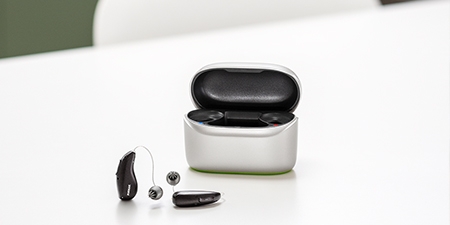Learn How Insomnia Often Impacts Hearing Loss

Learn How Insomnia Often Impacts Hearing Loss
10 min
Published December 29, 2024
The Impact of Insomnia on Hearing Loss
The importance of a good night's sleep can't be overstated in today's fast-paced world. However, many adults in the U.S. report experiencing symptoms of insomnia annually, and the ripple effects of sleep disturbances are widespread. While mental and physical health both suffer from a lack of sleep, one significant yet often overlooked consequence of insomnia is its impact on hearing loss.
Poor Blood Flow and Circulation
One key way insomnia affects hearing is through its impact on blood flow. Proper circulation is crucial for the health of all our organs, including the ears. Insomnia can lead to poor circulation, and when the ears don't receive an ample supply of blood, it affects their function and can impair hearing. A healthy cardiovascular system ensures the delicate structures in the ear receive the nutrients and oxygen they need to function correctly.
Sleep Apnea and Inflammation
Sleep apnea, a condition characterized by shallow or interrupted breathing during sleep, often accompanies insomnia. This disruption in sleep can lead to inflammation in the blood vessels, which may contribute to signs of hearing loss. In some cases, treating sleep apnea has been found to improve hearing, highlighting the interconnectedness of sleep and auditory health.
The Complicated Cycle of Tinnitus and Insomnia
Tinnitus, or the perception of ringing in the ears, presents a unique challenge for those with insomnia and vice versa. Individuals with both conditions often report a lowered tolerance for tinnitus symptoms due to lack of sleep. Conversely, the stress and anxiety caused by tinnitus can make it difficult to fall asleep, creating a troubling cycle where each condition exacerbates the other. Seeking tinnitus treatment from an audiologist can alleviate the symptoms and improve sleeping patterns.
Empowering Solutions for Better Hearing Health
Understanding the link between insomnia and hearing loss is crucial for taking proactive steps toward better health. Here are some empowering solutions to consider:
Prioritize Quality Sleep:
Create a calming bedtime routine
Limit exposure to screens before bed
Invest in a comfortable mattress and pillows
Seek medical advice for conditions like sleep apnea
Consider cognitive-behavioral therapy for insomnia (CBT-I)
Practice mindfulness and relaxation techniques
Stay active with regular exercise
Schedule a hearing test if you show symptoms of loss
Use ear protection when exposed to loud noises
Improving Your Sleep May Improve Your Hearing
It's vital to recognize the link between healthy habits and how they affect overall wellness, including sleep quality and hearing ability. By prioritizing rest and addressing sleep disorders, you can take significant steps to protect yourself from different types of hearing loss. Remember, better sleep not only enhances your overall well-being but also safeguards one of your most vital senses—your hearing. Contact an AudioNova hearing center near you to schedule a complimentary hearing exam and to learn more about hearing aids.




